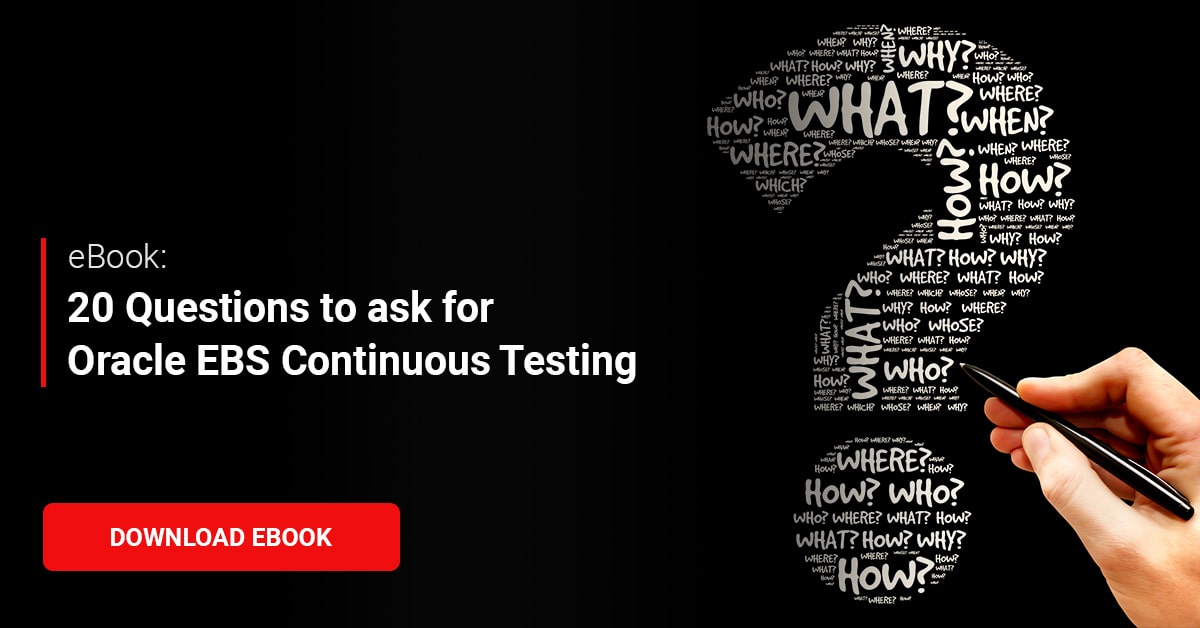You want to significantly reduce testing time and effort by allowing users to automate end-to-end business processes for your critical Oracle Applications such as your eBusiness suite. You wish to run your tests with every application change, reducing risk while increasing go-to-market speed. You cannot skip any key element in your Oracle EBS Continuous Testing Strategy.
Take for instance an update in the finance module a change gets applied across pricing, inventory, and other key modules. How do you come to know that a change impacts what, when and where?
With the help of the right people, practices, tools, and time you can build a continuous testing culture which requires the right balance of effort across all your testing efforts. Everything that will be included in a build and used during deployment to an environment (testing or production) should be reviewed by a team of experts assembled for this purpose.
With frequent bugs the team may view them as a waste of time as the problem might be lying in the early stage of change applied. The review process should confirm that the new and modified software is following the organization’s coding standards and adheres to its best practices.
For a successful build apply these key elements that enable continuous testing, and the teams need to spend effort on each of these practices, whether or not they want to.
1. Managing Defects
You need to be sure the applicable change impacts which application or which integration or security gets exposed. Sometimes, the problem lies outside the application itself — in the test environment, the test data, the test script itself, or some combination of these things.
Having a collaborative environment to log and track defects is essential in your Oracle application development life cycle, but managing defects is just the tip of the iceberg when it comes to adopting the right set of practices.
2. Managing Tests and Scripts
Plan your testing effort by creating test cases and scripts, executing the tests and finally Tracking and reporting on the progress of EBS testing. Continuously keep asking yourself if you are spending time manually crafting status reports and rolling up test execution results or Do you have a tool that provides test execution results in real-time and allows you to drill down to the root cause of the problem as needed?
One of the best practices that test teams typically adopt is test management, which includes the following:
» Planning the testing effort » Identifying needed tests » Creating test cases and scripts » Gathering existing tests Executing the tests » Identifying redundant, duplicate, and overlapping tests » Tracking and reporting on the progress of testing
This test management practice helps both teams and management understand at a glance if tests are passing, failing, or being blocked.
3. Automating Tests
When your teams discover that running all their tests manually is inefficient, ineffective, and, in many cases, downright impossible. Successfully creating a robust and maintainable test automation framework can be difficult if not approached as a software development project itself. Common vision, requirements, architecture, design, coding, and validation are needed here without which your automation testing efforts become delicate and breakable, difficult to undo and increase cost.
Engage a Oracle expert partner / vendor with programmers who also have expertise in automating the testing process before passing it onto production. Ignoring these best practices that could be delivered much earlier in the software development life cycle (SDLC) often results in unnecessary delays in later stages and increased costs. This will ensure the Quality of Oracle EBS application software where the application is critical to the business process.
4. Analyzing Efforts
Where to spend their precious testing efforts? You should consider test automation, test analytics and insights practices should be one area. Updates/ Patch / Code change impact analysis can be a difficult task, especially if you aren’t rigorous and consistent with their change sets. Understanding what has changed from the last build is critical for selecting the right sets of tests to run. Defect density versus test execution coverage in specific areas of the application can provide insightful data to identify root causes of defects. However, analyzing that data can be time consuming. This is where analytical services can help. Without that analysis, over-testing — or retesting everything — is a tempting but costly answer.
5. Creating Test Environments
For being able to test continuously one needs to consider automating the provisioning of test environments. Standing up production-like test labs to meet the demands of your Oracle applications team’s responsibility. If you are able to devise the right test scripts you can succeed in orchestrating and making the process repeatable, reliable, and traceable, the benefit potential is huge!
Automated creation and configuration of test environments decreases the time it takes to start testing a new build from hours, or even days or weeks, to minutes.
6. Gathering Test Data
Having the right sets of test data will help you increase test effectiveness. Extracting right-sized data from a production environment and automatically masking it for security purposes accelerates the availability of realistic test data. A good set of test data also helps the team create exception or error situations that might be difficult to test otherwise.
With an Oracle expert testing services provider you should expect Easy to develop & execute tests to achieve high ROI, greater Test coverage and quality. Script-less Testing-as-a-Service for your Oracle Onprem, Oracle Fusion application and Oracle Public Cloud Infrastructure will be a plus.
At IT Convergence, we provide a full spectrum of Digital Testing Services to automate beyond classic automated testing. From Classical testing, Non-Functional testing, ERP testing, Extreme test automation, Framework Development, Transformational Services, to name a few, there’s a solution ready for you to help achieve ROI and business value faster than with traditional testing techniques.




